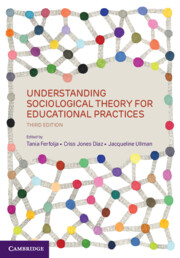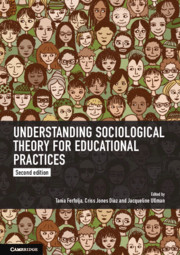54 results

Understanding Sociological Theory for Educational Practices
- Coming soon
-
- Expected online publication date:
- August 2024
- Print publication:
- 31 August 2024
-
- Textbook
- Export citation
Issues for recruitment and retention of clinical research professionals at academic medical centers: Part 1 – collaborative conversations Un-Meeting findings
-
- Journal:
- Journal of Clinical and Translational Science / Volume 6 / Issue 1 / 2022
- Published online by Cambridge University Press:
- 03 June 2022, e80
-
- Article
-
- You have access
- Open access
- HTML
- Export citation
Academic medical center clinical research professional workforce: Part 2 – Issues in staff onboarding and professional development
-
- Journal:
- Journal of Clinical and Translational Science / Volume 6 / Issue 1 / 2022
- Published online by Cambridge University Press:
- 03 June 2022, e81
-
- Article
-
- You have access
- Open access
- HTML
- Export citation
527 Academic Medical Center Clinical Research Professional Recruitment, Retention and Diversity
-
- Journal:
- Journal of Clinical and Translational Science / Volume 6 / Issue s1 / April 2022
- Published online by Cambridge University Press:
- 19 April 2022, p. 110
-
- Article
-
- You have access
- Open access
- Export citation
3082 Cardiovascular Health Promotion Among African-Americans: Community Participatory Approach to Design an Innovative Mobile-Health Intervention
-
- Journal:
- Journal of Clinical and Translational Science / Volume 3 / Issue s1 / March 2019
- Published online by Cambridge University Press:
- 26 March 2019, p. 85
-
- Article
-
- You have access
- Open access
- Export citation
A community engaged primary healthcare strategy to address rural school student inequities: a descriptive paper
-
- Journal:
- Primary Health Care Research & Development / Volume 20 / 2019
- Published online by Cambridge University Press:
- 20 March 2019, e26
-
- Article
-
- You have access
- Open access
- HTML
- Export citation
Part 2 - Intersecting Theories for Meaning: Postcolonialism, Critical Race Theory and Cultural Theory
-
- Book:
- Understanding Sociological Theory for Educational Practices
- Published online:
- 27 March 2019
- Print publication:
- 04 June 2018, pp 83-156
-
- Chapter
- Export citation
Chapter 1 - The unseen half: Theories for educational practices
-
-
- Book:
- Understanding Sociological Theory for Educational Practices
- Published online:
- 27 March 2019
- Print publication:
- 04 June 2018, pp 1-22
-
- Chapter
- Export citation
Chapter 1 - The unseen half: Theories for educational practices
-
-
- Book:
- Understanding Sociological Theory for Educational Practices
- Published online:
- 27 March 2019
- Print publication:
- 04 June 2018, pp 1-22
-
- Chapter
- Export citation
Part 1 - Applying Poststructuralism(s)
-
- Book:
- Understanding Sociological Theory for Educational Practices
- Published online:
- 27 March 2019
- Print publication:
- 04 June 2018, pp 23-24
-
- Chapter
- Export citation
Contents
-
- Book:
- Understanding Sociological Theory for Educational Practices
- Published online:
- 27 March 2019
- Print publication:
- 04 June 2018, pp xi-xv
-
- Chapter
- Export citation

Understanding Sociological Theory for Educational Practices
-
- Published online:
- 27 March 2019
- Print publication:
- 04 June 2018
-
- Textbook
- Export citation
Copyright page
-
- Book:
- Understanding Sociological Theory for Educational Practices
- Published online:
- 27 March 2019
- Print publication:
- 04 June 2018, pp iv-iv
-
- Chapter
- Export citation
Chapter 13 - Final ruminations on the ‘unseen half’
- from Part 3 - Using Critical Theory
-
-
- Book:
- Understanding Sociological Theory for Educational Practices
- Published online:
- 27 March 2019
- Print publication:
- 04 June 2018, pp 228-236
-
- Chapter
- Export citation
List of Contributors
-
- Book:
- Understanding Sociological Theory for Educational Practices
- Published online:
- 27 March 2019
- Print publication:
- 04 June 2018, pp xvi-xx
-
- Chapter
- Export citation
Index
-
- Book:
- Understanding Sociological Theory for Educational Practices
- Published online:
- 27 March 2019
- Print publication:
- 04 June 2018, pp 237-243
-
- Chapter
- Export citation
Contents
-
- Book:
- Understanding Sociological Theory for Educational Practices
- Published online:
- 27 March 2019
- Print publication:
- 04 June 2018, pp xi-xv
-
- Chapter
- Export citation
Part 3 - Using Critical Theory
-
- Book:
- Understanding Sociological Theory for Educational Practices
- Published online:
- 27 March 2019
- Print publication:
- 04 June 2018, pp 157-236
-
- Chapter
- Export citation
Acknowledgements
-
- Book:
- Understanding Sociological Theory for Educational Practices
- Published online:
- 27 March 2019
- Print publication:
- 04 June 2018, pp xxiii-xxiv
-
- Chapter
- Export citation
Part 2 - Intersecting Theories for Meaning: Postcolonialism, Critical Race Theory and Cultural Theory
-
- Book:
- Understanding Sociological Theory for Educational Practices
- Published online:
- 27 March 2019
- Print publication:
- 04 June 2018, pp 83-84
-
- Chapter
- Export citation



